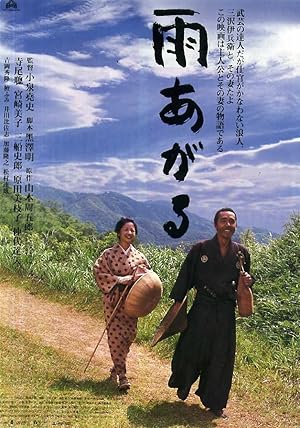
After the Rain Page #2
- Year:
- 1999
- 91 min
- 470 Views
without speaking of the sweat
when the husband emerges,
jumping in the sandals quickly
here's the scream
I'm sorry.
I ask your forgiveness.
You have participated in a duel...
in all sincerity...
I have indeed fought.
I didn't have a choice...
after hearing them...
really...
they were all embarrassed.
She was furious.
in truth, I...
You did promise me not to
get personally engaged in any duels.
really...
I had left
to pawn my sword...
but the pawnshop-owner was absent...
It's really the truth. Forgive me.
I won't do it again.
Would you please accept
This.
Just take a little bit...
to prove your forgiveness.
My big sister was so cold
that she warmed up
her backside at the stove.
that the stove began squeaking everywhere.
It stopped raining!
It has stopped raining, it's true,
but you won't be able to cross the river
for some time.
Anyway, it stopped raining
and that's great!
Master!
Thank you very much
for yesterday-evening!
You made the rain stop!
Right!
We owe you a lot.
Master!
Where are you going to
on such a great morning?
Just going for a walk. After this rain,
I feel totally benumbed.
What could I be good at?
I wonder
For me, it doesn't matter,
but there is also my good wife Tayo,
Come on, pull yourself together,
Misawa he
Stop this waist!
Useless to interfere!
One last time!
- Do you really want to fight?
- Yes!
Stop!
Stop, I beg you!
No!
Swords are not made for butchery
...if not they're used by imbeciles.
There here to suppress
the stupidity in our hearts.
Who are you, idiot?
I am right...
Get out of here!
It's a man's fight!
- But...
- Silence
I am sorry!
stop!
That's enough!
Private duels are prohibited!
Fools!
- you dawdlers!
- Your horse, sir...
In comparison, our horses
are no more than jades.
Shut up!
Bring me those idiots.
I don't know with whom I have the honor,
but, for stopping this ridiculous duel...
I, Shigeaki, Lord of this fief,
express my sincerest gratitude.
I watched everything with great attention,
from the top of that hill there...
As a matter of fact, it was very
impolite of me.
Not at all.
I was charmed to assist
a demonstration of such quality
and by a bare-footed man,
If you permit me...
I thank you.
Are you staying over here?
At the Matsuba-inn.
I'm a ronin.
With all this rain,
I couldn't cross the river...
I see... It must be overwhelming.
Tell me...
to distract yourself, What would you
say about coming to the castle?
I wouldn't know!
Well, then...
I before you,
send by the lord of this fief.
am Gonnojo, the chief of his garde,
at your service.
I also belong to his garde
Translation
Translate and read this script in other languages:
Select another language:
- - Select -
- 简体中文 (Chinese - Simplified)
- 繁體中文 (Chinese - Traditional)
- Español (Spanish)
- Esperanto (Esperanto)
- 日本語 (Japanese)
- Português (Portuguese)
- Deutsch (German)
- العربية (Arabic)
- Français (French)
- Русский (Russian)
- ಕನ್ನಡ (Kannada)
- 한국어 (Korean)
- עברית (Hebrew)
- Gaeilge (Irish)
- Українська (Ukrainian)
- اردو (Urdu)
- Magyar (Hungarian)
- मानक हिन्दी (Hindi)
- Indonesia (Indonesian)
- Italiano (Italian)
- தமிழ் (Tamil)
- Türkçe (Turkish)
- తెలుగు (Telugu)
- ภาษาไทย (Thai)
- Tiếng Việt (Vietnamese)
- Čeština (Czech)
- Polski (Polish)
- Bahasa Indonesia (Indonesian)
- Românește (Romanian)
- Nederlands (Dutch)
- Ελληνικά (Greek)
- Latinum (Latin)
- Svenska (Swedish)
- Dansk (Danish)
- Suomi (Finnish)
- فارسی (Persian)
- ייִדיש (Yiddish)
- հայերեն (Armenian)
- Norsk (Norwegian)
- English (English)
Citation
Use the citation below to add this screenplay to your bibliography:
Style:MLAChicagoAPA
"After the Rain" Scripts.com. STANDS4 LLC, 2024. Web. 16 Apr. 2024. <https://www.scripts.com/script/after_the_rain_2652>.


Discuss this script with the community:
Report Comment
We're doing our best to make sure our content is useful, accurate and safe.
If by any chance you spot an inappropriate comment while navigating through our website please use this form to let us know, and we'll take care of it shortly.
Attachment
You need to be logged in to favorite.
Log In